Social anxiety of Russian students: a territorial aspect
Relevance. The article is focused оn the analysis of social anxiety and social phobia of modern Russian students of six regions of the Russian Federation in the context of a Special Military Operation and the sanctions pressure of the collective West on our state and its citizens. Research problem. The purpose of our research is to study the manifestations of social anxiety and sociоphobia caused by military actions among Russian students as a special socio-demographic group of people of the younger generation exposed to social risks. Methods. The total number of respondents was 991 people. All respondents are students of higher educational institutions. The research methodology is the Questionnaire of social anxiety and sociobia (OSTiSF). The article analyzes the data of psychological testing (face-to-face and online) of the large-scale interregional socio-psychological study “Russian students: assessments and patterns of the present and future as a basis for the formation of civic and value attitudes”. Research results. It was determined that the dominant type of social anxiety is post-situational rumination. The highest level of social anxiety was observed among young people living in the new Russian territories. Respondents from the newly annexed territories of the Russian Federation have a statistically higher level of social anxiety and sociоphobia than respondents from Belgorod and the Rostov region. Also, social anxiety is higher in women than in men. Conclusions. Psychological correction of social anxiety and sociophobia among modern youth is an important sphere of implementation of university youth policy. Its solution is the prerogative of specialised units of university psychological services.
Figures
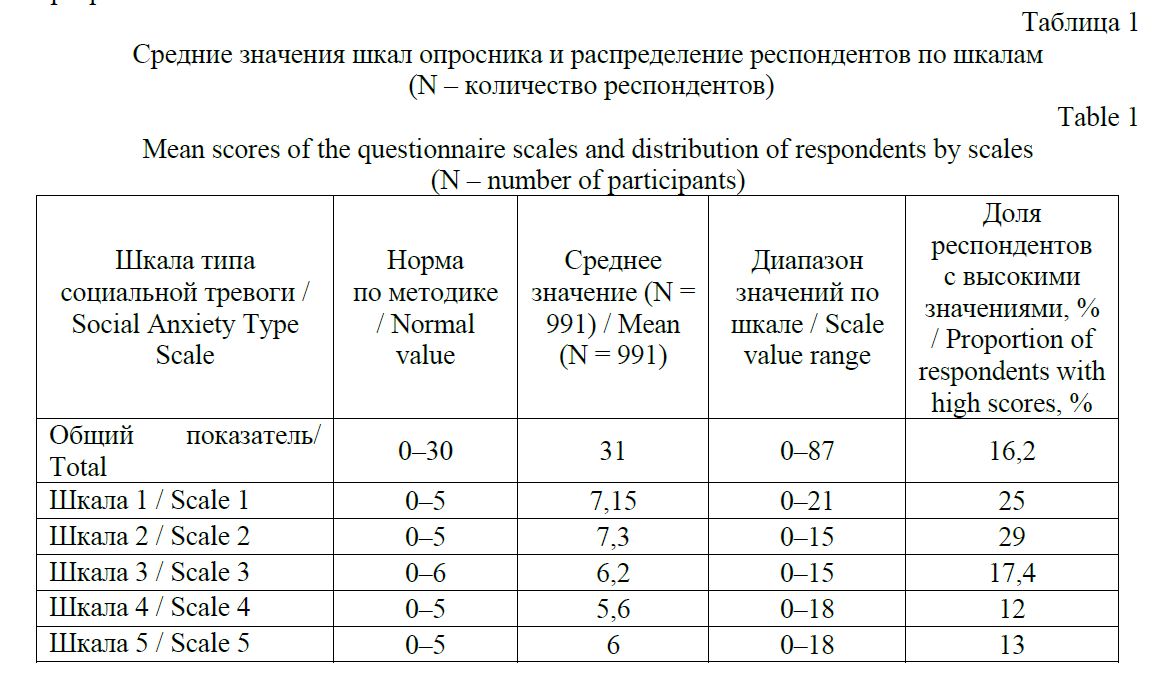
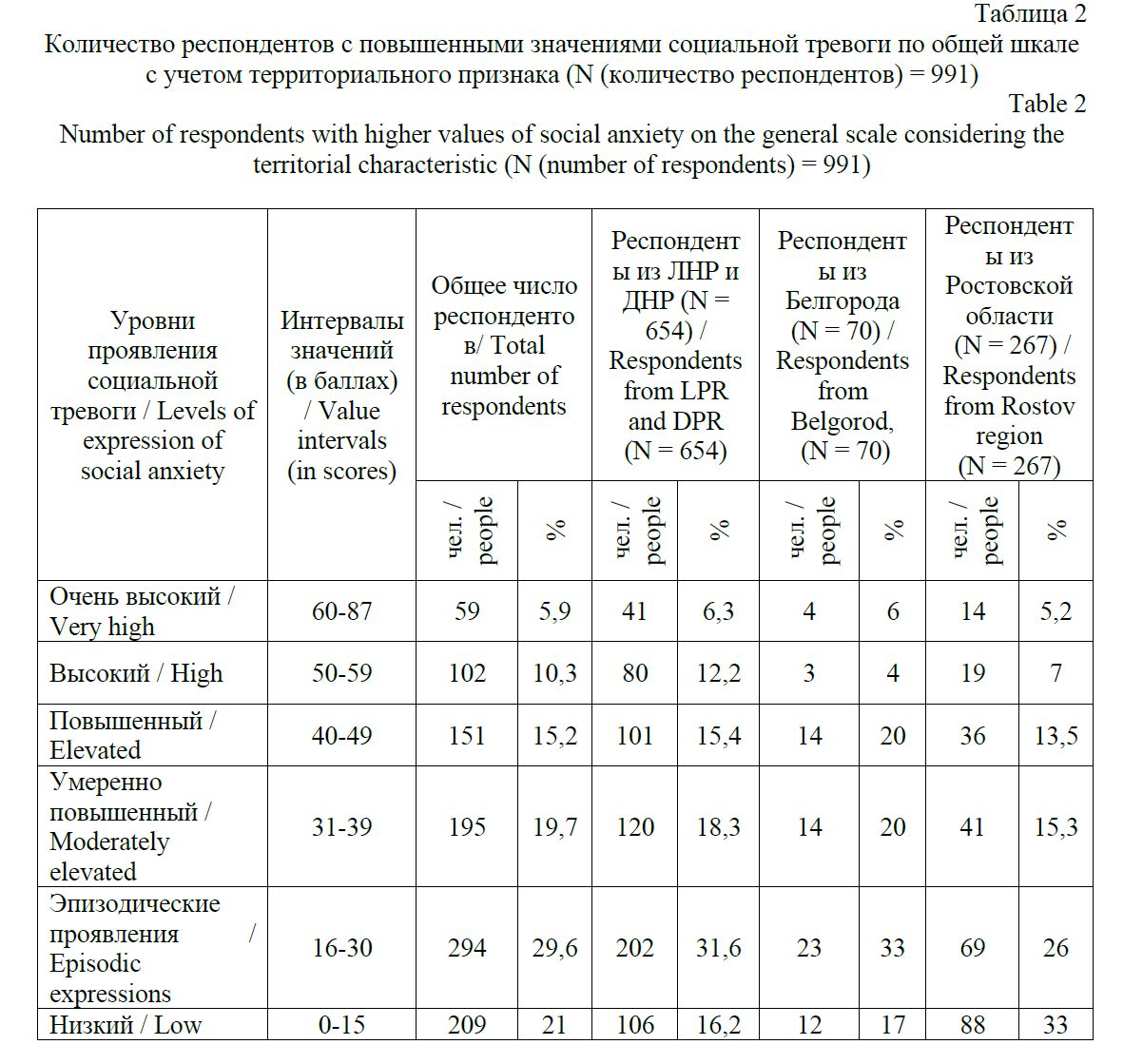
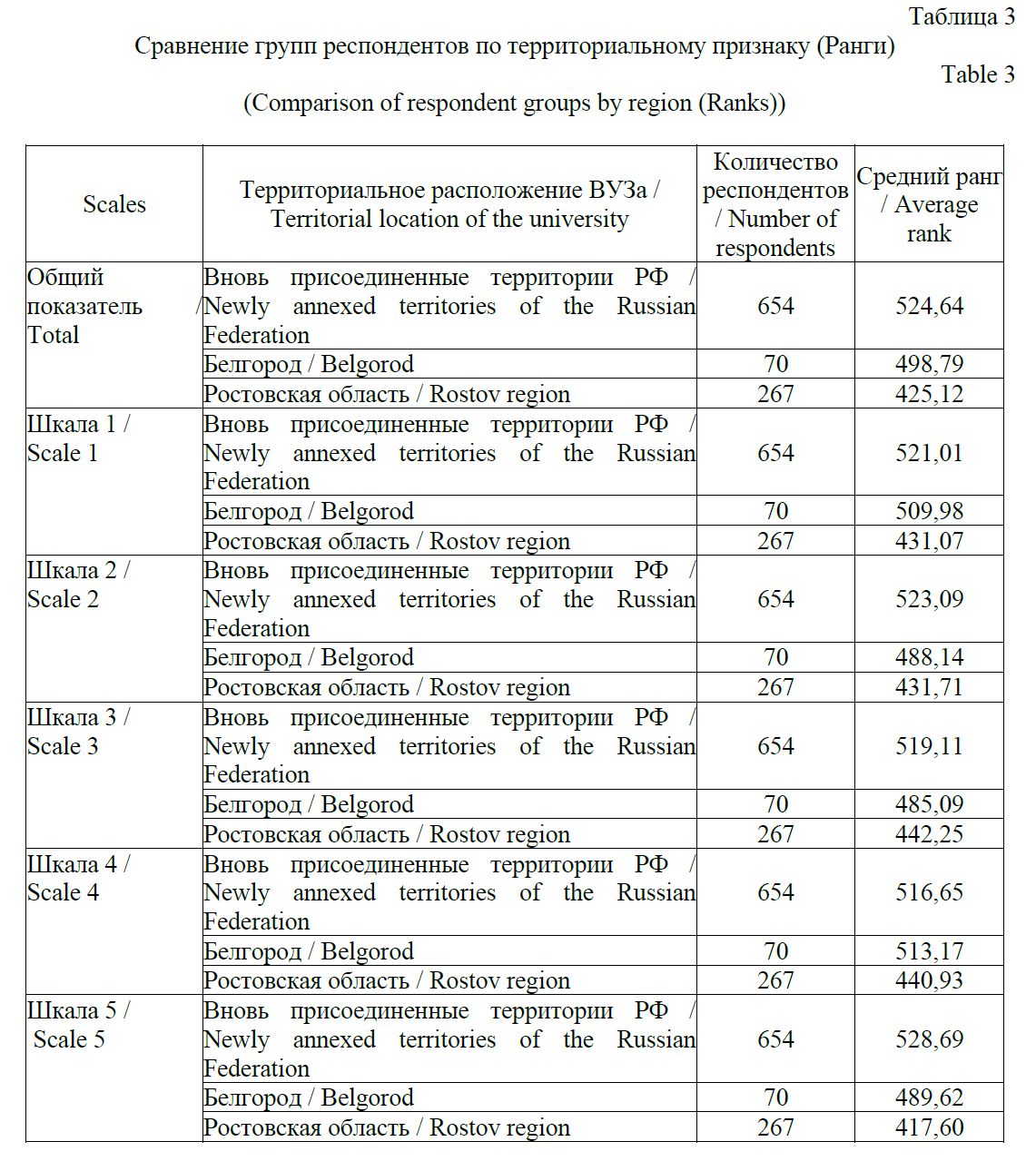
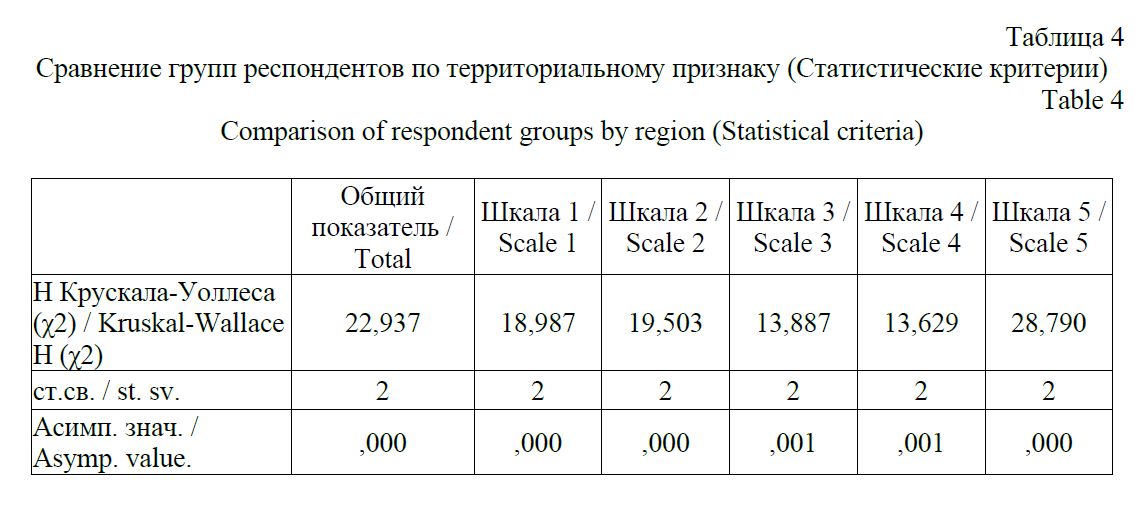
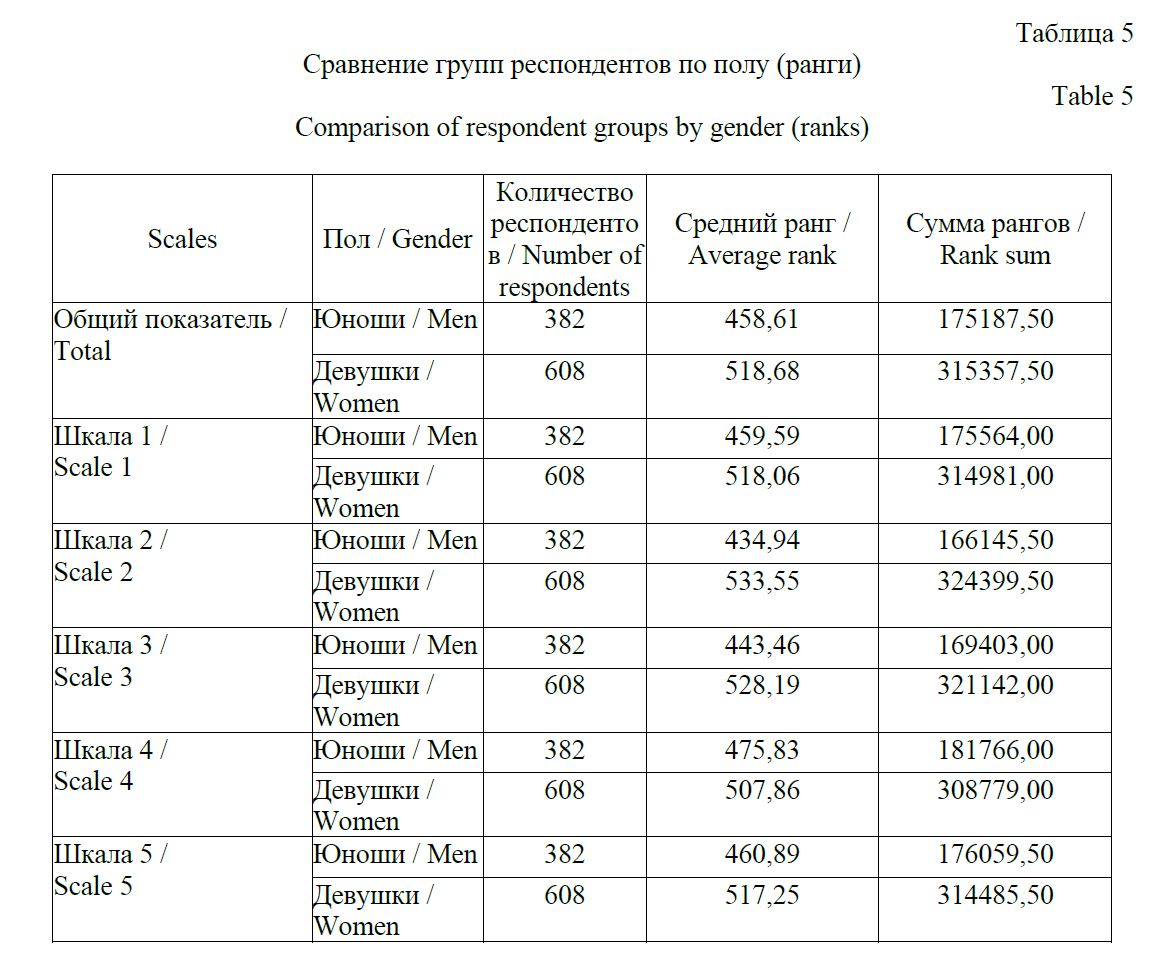
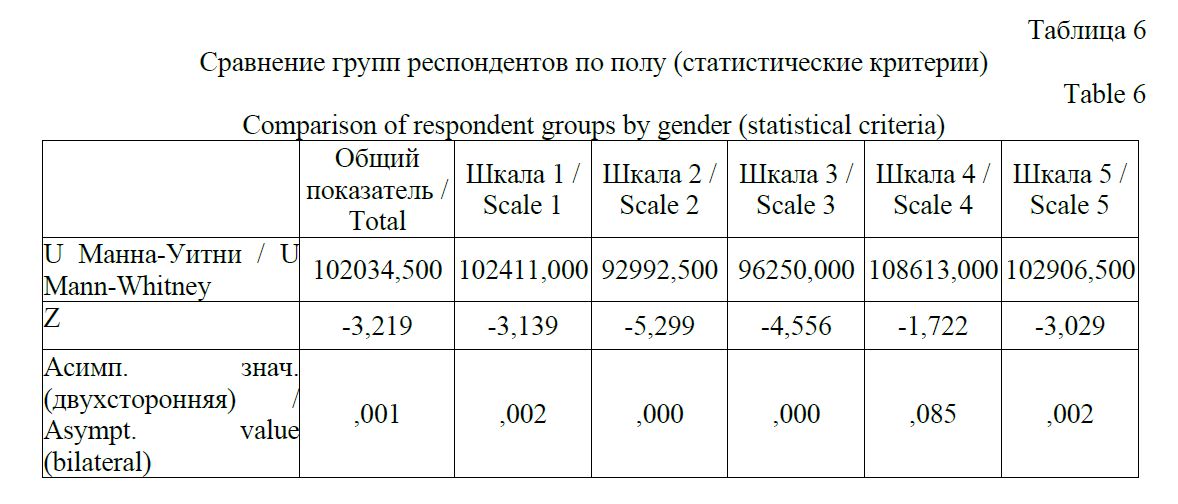
Zinchenko E. V., Filonenko V. I., Detochenko L. S., Voronaya V. D. (2024), “Social anxiety of Russian students: a territorial aspect”, Research Result. Sociology and Management, 10 (3), 133-149, DOI: 10.18413/2408-9338-2024-10-3-0-9.


















While nobody left any comments to this publication.
You can be first.
Abakumova, I. V. and Ryadinskaya, E. N. (2017), “Specificity of individual-psychological reactions of the personality living in the armed conflict area”, Voprosy zhurnalistiki, pedagogiki, yazykoznanya, (7), 177-181. (In Russian)
Avksentiev, V. A., Gritsenko, G. D. and Maslova, T. F. (2008), “Social well-being of the youth of the North Caucasus”, Sotsiologicheskie issledovanya, (2), 91-96. (In Russian)
Bareisha, A. G. (2014), “Social fears in the structure of social well-being”, Mezhdunarodny nauchno-issledovatelsky zhurnal, (1-4), 83-85. (In Russian)
Bulanova, M. B. and Velikaya, N. M. (2021), “Digitalization of higher education during the pandemic: advantages and risks”, University management: practice and analysis, 25 (4), 25-36, DOI: 10.15826/umpa.2021.04.034. (In Russian)
Didkovskaya, Ya. V., Vishnevsky, Yu. R. and Zyryanova, O. B. (2022), “Social security of student youth as a subjective perception of risks”, Research Result. Sociology and Management, 8 (4), 57-70, DOI: 10.18413/2408-9338-2022-8-4-0-6. (In Russian)
Enikolopov, S. N. and Grigorieva, I. V. (2016), “Testing of the questionnaires “Liebowitz Social Anxiety Scale” and “Fear of Negative Evaluation Scale (short version)”, Nacional'ny psikhologichesky zhurnal, (1), 31-44. (In Russian)
Zakharova, N. M. (2020), “Mental and behavioral disorders in the civilian population of the region subjected to local military operations”, Psychology and Law, 10 (4), 185-197. (In Russian)
Krasnova-Golieva, V. V. and Kholmogorova, A. B. (2011), “Social anxiety and student maladaptation”, Psychological science and education psyedu.ru [Electronic], 3 (1), available at: https://psyournals.ru/journals/psyedu/archive/2011_n1/39944 (Accessed 26 June 2024). (In Russian)
Levada, Y. A. and Shanin, T. (2005), “History of Generations and Generational History”, Human. Community. Management, 3, 17-38. (In Russian)
Lopatina, O. (2023), “Influence of Russian-Ukrainian military (combat) actions on the psychological state of citizens”, Zdorovie cheloveka, teorya i metodika fizicheskoy kultury i sporta, 1 (29), 122-131. (In Russian)
Luneva, P. D. and Ababkov, V. A. (2023), “Coping behavior in social phobias”, Vestnik of St. Petersburg University. Psychology, 13 (2), 147-163. (In Russian)
Mareeva S. V. (2022), “The social status of Russian youth: ideas and reality”, Bulletin of the Institute of Sociology, 13(2), 158-183. (In Russian)
Nestik, T. A. (2023), “The impact of military conflicts on the psychological state of society: promising directions of research”, Sotsialnaya Psikhologya i obshhestvo, 14 (4), 5-22. (In Russian)
Pevnaya, M. V., Shuklina, E. A., Kienko, T. S., Tarasova, A. N., Andrianova, T. V., Khudyakova, M. V. and Shapovalova, I. S. (2022), “Fears of Russian students in the situation of social uncertainty (spring 2022)”, Nauchny rezul'tat. Sociologya i upravlenie, 8 (3), 116-136, DOI: 10.18413/2408-9338-2022-8-3-0-9. (In Russian)
Ralnikova, I. A. and Shamardina, M. V. (2020), “Social anxiety as a factor in the formation of subjective picture of life path during the normative crisis of adolescence”, Psychologist, (2), 15-31. (In Russian)
Radaev, V. V. (2019), Millenialy: kak menyaetsya rossyskoe obshhestvo [Millennials: how Russian society is changing], Izd. h. HSE, Moscow, Russia. (In Russian)
Sagalakova, O. A., Stoyanova, I. Y. and Truevtsev, D. V. (2014), “Social anxiety – a marker of antivital behavior in adolescence”, Clinical and medical psychology: research, training, practice, 4(6), [Online], available at: http://medpsy.ru/climp/2014_4_6/article01.php (Accessed 26 June 2024). (In Russian)
Sagalakova, O. A. and Truevtsev, D. V. (2012), “Questionnaire of social anxiety and sociophobia”, Medical Psychology in Russia, 4 (15), [Online], available at: http://www.medpsy.ru/mprj/archiv_global/2012_4_15/nomer/nomer19.php (Accessed 26 June 2024). (In Russian)
Sotsialnoe samochuvstvie i otnoshenie studencheskoy molodezhi k spetsialnoy voennoy operatsii Rossyskoy Federatsii v Ukraine: monografya [Social well-being and attitude of student youth to the Special Military Operation of the Russian Federation in Ukraine: a monograph] (2024), in Filonenko, V. I. (ed.), Publishing House of the Southern Federal University, Rostov-on-Don, Russia. (In Russian)
Sotsialnoe samochuvstvie molodezhi Sverdlovskoy oblasti v 2015 godu: itogi sotsiologicheskogo issledovanya: kollektivnaya monografya [Social well-being of youth in the Sverdlovsk region in 2015: the results of sociological research: a collective monograph] (2016), in Vishnevsky, Yu. R. and Narkhov, D. Yu. (ed.). Izd. h. UMC UPI, Yekaterinburg, Russia. (In Russian)
Sushko, P. Е. (2023), “Dynamics of indicators of subjective social well-being of Russians (2003–2023)”, Bulletin of the Institute of Sociology, 12, 59-71. (In Russian)
Twenge, D. (2019), Pochemu pokolenie interneta utratilo buntarsky duh, stalo bolee tolerantnym, menee schastlivym i absolyutno ne gotovym ko vzrosloy zhizni [Generation I. Why the Internet Generation has lost its rebellious spirit, has become more tolerant, less happy and absolutely unprepared for adult life]. RIPOL Classic Campaign Group, Moscow, Russia. (In Russian)
Frolova, E. V. and Rogach, O. V. (2023), “Social well-being of Russians in the spring of 2022”, Sociological Research, (5), 160-166. (In Russian)
Tsvetkova, N. A. (2024), “Features of socio-psychological status of students with social anxiety in the parental family”, Vestnik Gosudarstvennogo universiteta prosveshhenya. Serya: Psikhologicheskie nauki, (1), 105-120. (In Russian)
Shkurko, T. A., Zinchenko, E.V. and Serikov, G.V. (2009), “Current issues of theory and practice of psychological help to the individual in a difficult life situation”, Russian Psychological Journal, 6 (4), 25-28. (In Russian)
Shmarion, Yu. V. and Zemlyanskaya, A. V. (2022), “Riskogenic impact of visual content on the socialization of young people”, Research Result. Sociology and Management, 8 (4), 22-30. DOI: 10.18413/2408-9338-2022-8-4-0-3 (In Russian)
ElBarazi, A. and Meshreky, P. (2024), “The Management of Social Anxiety: More Than 25 Years Later, Where are we?”, Illness, Crisis & Loss, 32 (1), 131-141.
Barkowski, S., Schwartze, D., Strauss, B., Burlingame, G. M., Barth, J. and Rosendahl, J. (2016), “Efficacy of group psychotherapy for social anxiety disorder: A meta-analysis of randomized-controlled trials”, Journal of Anxiety Disorders, 39, 44-64.
Riad, A., Drobov, A., Krobot, M., Antalová, N., Alkasaby, M. A., Peřina, A. and Koščík, M. (2022), “Mental Health Burden of the Russian–Ukrainian War 2022 (RUW-22): Anxiety and Depression Levels among Young Adults in Central Europe”, International Journal of Environmental Research and Public Health, 19, 1-14, DOI: 10.3390/yerph19148418.